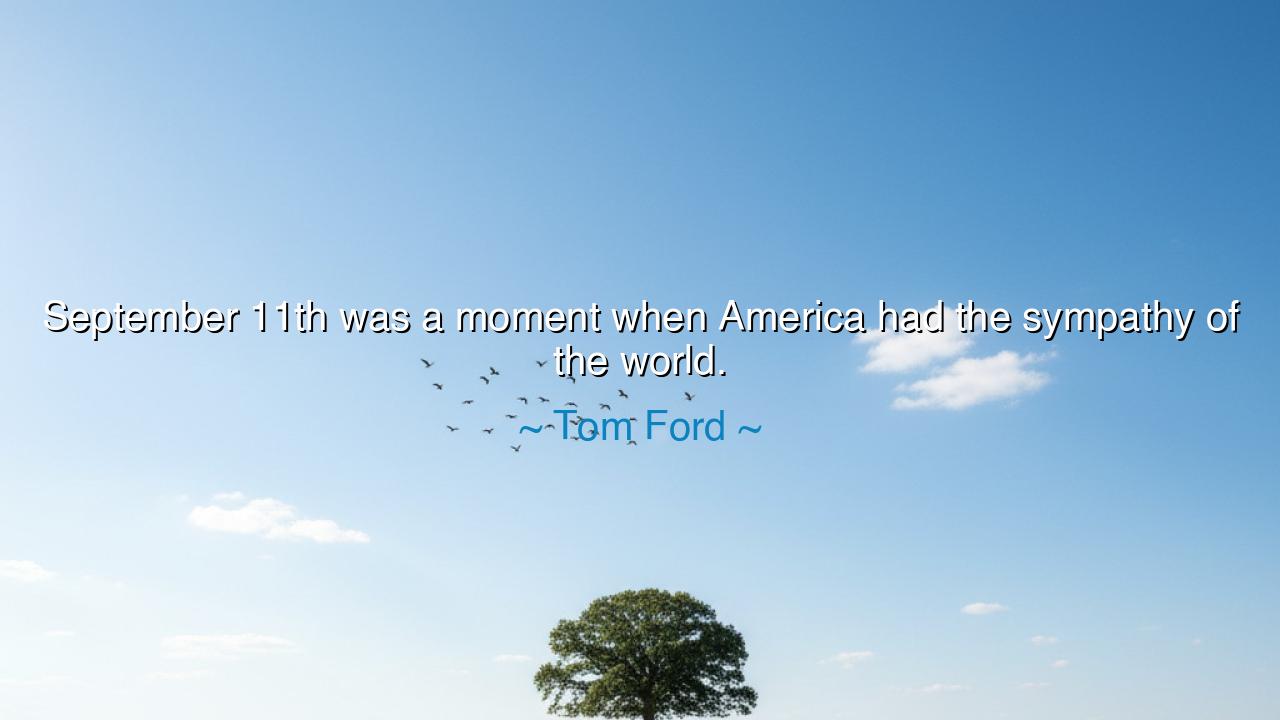
September 11th was a moment when America had the sympathy of the






In the solemn and reflective words of Tom Ford, we hear a truth both tender and haunting: “September 11th was a moment when America had the sympathy of the world.” These words do not merely recall a tragedy—they remind us of a fleeting unity, a rare and fragile instant when the boundaries of nations blurred, and the shared heart of humanity beat as one. Ford, a creator and observer of culture, was not speaking as a politician or historian, but as a witness to the collective emotion that swept across the globe on that dark day in 2001. His words capture the paradox of catastrophe—that in the depths of destruction, there can arise an overwhelming wave of compassion and solidarity, revealing the hidden goodness that still dwells within the human soul.
The origin of this quote lies in the aftermath of the September 11, 2001 attacks, when the United States suffered one of the most devastating acts of terror in its history. Nearly three thousand souls perished when planes were turned into weapons, and the towers that once touched the heavens crumbled into dust. Yet, in that hour of pain, something extraordinary happened: the world wept with America. Across cities and villages, people lit candles, offered prayers, and stood in silent mourning. From London to Tokyo, from Cairo to Cape Town, strangers gathered before embassies to lay flowers and speak words of comfort. For a moment, humanity remembered its shared vulnerability. The divisions of politics, race, and religion faded, replaced by a universal grief that transcended every border.
When Ford says that America “had the sympathy of the world,” he speaks not of power, but of empathy. In that brief moment, the world did not see a superpower—they saw a people brought to their knees by sorrow, and thus made human again. The towering skyscrapers, symbols of might and ambition, fell, and in their ruins, the world saw the fragility that unites us all. Even nations once opposed to American influence paused their quarrels, for pain recognizes no enemy. That day reminded the world that beneath every flag beats the same mortal heart—that every mother’s cry for her lost child, every stranger’s act of rescue, every tear shed in silence, belongs to the same human story.
Consider the story of the firefighters of New York City, who rushed into the burning towers with no thought of their own lives. They climbed smoke-filled stairways as others descended, guided only by duty and love for their fellow man. Their courage moved not only Americans but people in distant lands who had never set foot on American soil. Across the oceans, countless citizens saw in those rescuers the universal face of heroism—proof that even in the worst darkness, the light of sacrifice can burn undimmed. It was this shared recognition—the nobility of human spirit amid ruin—that drew the world’s sympathy. The world mourned not only the dead of one nation, but the loss of innocence for all mankind.
Yet Ford’s words also carry a quiet sorrow, for that moment of unity did not endure. In time, the fires of compassion cooled, and the old divisions returned. Fear and anger hardened into suspicion; wars were waged in the name of security; the sympathy of the world, once so freely given, began to fade. Ford’s reflection is, therefore, both remembrance and warning. He reminds us how easily the bridges of empathy can crumble when pride and politics return to rule the heart. The tragedy of September 11th united humanity in grief—but the years that followed revealed how fragile that unity truly was.
From his insight, a deeper lesson emerges: tragedy should awaken compassion, not vengeance; unity, not division. The sympathy of the world was a gift—proof that humanity is capable of immense love when reminded of its mortality. But such compassion should not require disaster to be born. The challenge, as Ford’s words imply, is to preserve that spirit in peace as fiercely as we do in pain. To keep the world’s sympathy, we must live in a way that deserves it—through justice, humility, and mercy.
So, my children, take this teaching to heart. When you see another nation suffer, do not turn away; when your own heart breaks, do not harden it with bitterness. Let tragedy be a teacher, not a wound that festers. Empathy is the truest strength of civilization, and every time we act with kindness, we rebuild what terror sought to destroy. Tom Ford’s words remind us that the world’s sympathy is not a treasure to be kept, but a sacred trust to be honored. For when nations, and the people within them, choose understanding over enmity, the doves of peace may yet return to a sky once filled with smoke.
Thus, let us remember September 11th not only for its sorrow, but for the fleeting grace it revealed—the day when the world stood still, and, if only for a moment, all humanity spoke the same language: the language of compassion.






AAdministratorAdministrator
Welcome, honored guests. Please leave a comment, we will respond soon